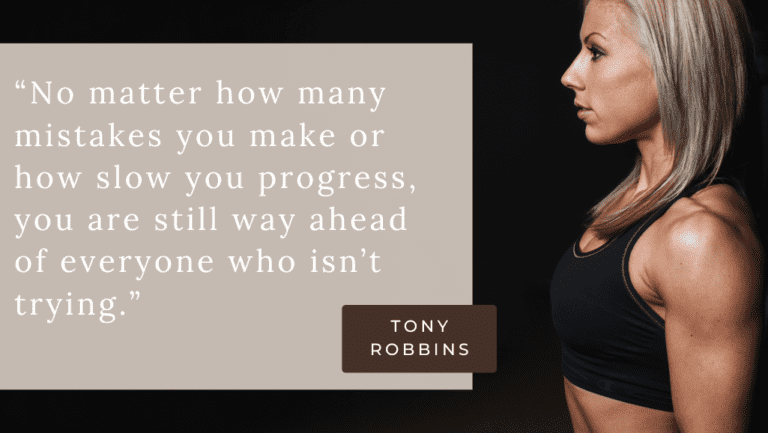Are you having a hard time accomplishing your goals lately? Wondering why your goals fail?
Maybe you start off strong, full of energy and excitement… and then suddenly, life happens. The motivation fades, distractions take over, and your goals end up collecting dust—again. Sound familiar?
Don’t worry, it’s not just you. The truth is, there are some surprisingly common (and sneaky!) mistakes that can quietly derail your progress before you even realize it.
Let’s break them down—so you get a fresh insight into what’s really standing in your way and how to finally set goals that stick, inspire, and actually get done.

What is an unrealistic goal?
Unrealistic goals are goals that are too big, too fast, or just not doable RIGHT NOW. They don’t match your current time, energy, situation or your abilities.
When a goal is unrealistic, it becomes easy to feel overwhelmed, give up, or feel like you’ve failed—even if you’re trying your best.
In contrast, setting realistic and achievable goals can help in staying motivated and positive, ultimately leading to greater success.
Unrealistic goals are often very tempting. Examples of such can be becoming a Hollywood star, mastering a language in months, or becoming a billionaire. While these aspirations are technically possible, they are largely improbable.
While ambition is definitely commendable, practicality is still the key.
Why are unrealistic goals bad?
When goals are perceived as impossible to achieve, they may reduce motivation instead of enhancing it.
For instance, highly unrealistic goals may seem unattainable, leaving goal-setters with the impression that they are irresponsible, uninformed, or incompetent. Who needs to feel like that about themselves?
When we set high expectations for ourselves that are not obtainable, we set ourselves up for disappointment and self-doubt. Moreover, hard goals can create unnecessary stress and tension in our lives, leading to burnout and discouragement.
That being said, unrealistic goals:
- damage your confidence.
- lead to disappointment
- limiting your flexibility
- causing you stress
- hinder your growth and progress.
Common goal-setting mistakes
Let me walk you through thirteen potential traps that many goal-setters fall into and how to steer clear of them.
1. you simply don't know HOW to get where you want
When we begin something new we think we must know every single step we need to take in order to get there. In reality, we don’t necessarily need to see the whole staircase – we just need to see the next logical step.
As we move forward, every position can be embraced as a new vantage point to better estimate the direction of our next move.
By focusing on what we can do AT THE MOMENT rather than trying to map out every detail of the future, we put ourselves in a better position to make progress.
As we gain new perspectives, our objectives can also shift. And it is perfectly fine. It’s okay for our plans to change along the way, it is good to be flexible!
As long as we stay open to new possibilities and keep moving forward, success will follow. It must.
2. your goals are not yours
No matter how resilient or strong you are, we all get influenced by our surroundings and the information stream that comes our way.
Social media has a huge impact on us nowadays. It sells us a fairy tale, a sugar-coated fiction, and let’s be honest, a lie- a BIG FAT LIE about how life is.
If you constantly scroll through other people’s accounts, there is a big chance that you make the majority of your life decisions in delirium. And they have little to do with what you really want.
HIGHLY RECOMMENDED:
The Miracle of Taking Social Media Break: Detoxing Step-By-Step
Setting goals that are not ours to begin with, is a very common thing. It’s easy to get trapped in the delusion of other people’s lives and make decisions based on that false reality.
It’s essential to take a step back and analyze what we truly want in life, rather than just following what others doing.
By setting authentic goals, we can lead a life that is true to ourselves, not influenced by irrelevant external chatter.
3. you are spending too much time planning and strategizing
It’s not uncommon to get stuck in the planning phase. Spending a lot of time strategizing and thinking about our next move is a type of escapism.
This tendency to procrastinate can stem from an ever-present feeling of not being ready, common to perfectionists. It is a form of a cover-up for fear of making mistakes or not meeting expectations.
However, it’s important to recognize that planning and doing are two separate things. Often the best way to move forward is to simply take action, not overanalyze whether it is perfect or not. Doing so gives you the confidence to realize that even if there are bumps in the road, you’ll figure out a way to get through them.
4. you are impatient
Have you ever wondered why after all your hard work and effort you are still not a millionaire? You’ve already put so much time and effort in, and still no return.
If you’re expecting immediate greatness, you might be falling victim to a common trap. Success is never guaranteed just because you put in some effort here and there. And if you are getting impatient that only means you need a reality check.
Take a step back and examine your expectations. Are they feasible?
Consider giving your goals a specific timeframe before quitting. When I started my blog, I gave myself a year to achieve my objectives, and whenever I felt discouraged, I would remind myself that I had not yet reached this term. This approach helped me tremendously.
People often say that motivation doesn't last. Well, neither does bathing – that's why we recommend it daily.
I truly believe that not seeing results—or seeing only tiny progress—is one of the hardest parts of working toward your goals. It’s the thing that trips most people up time and time again.
Finding the internal capacity and strength to keep going, to stay consistent even when the progress feels invisible, is what sets achievers apart from the rest.
So, it’s VERY important to remain consistent and disciplined and not get discouraged when you don’t see instant results. Re-focus, and remember that success takes time and persistence.
5. you get discouraged at first failure
If you are a perfectionist at your core, please accept my condolences – the journey will be twice as harder for you.
If your mentality craves full control over everything that is happening and not giving extra space for detours and setbacks, you will find yourself discouraged very soon.
It’s important to recognize that failure is a learning opportunity, not a defeat.
Instead of jumping to early conclusions and assuming that failure means it’s time to give up, reflect on what went wrong, adjust your approach, and try again.
A failure in something you do doesn’t mean YOU are the failure. That means you are not sitting on your ass being lazy, but rather working on your goals and overcoming difficulties that come with that. That it.
6. you set too many goals at once
When it comes to setting goals, it’s easy to get a little too ambitious. After all, there’s so much we want to achieve in life, and setting big goals can be a great way to push ourselves to reach our full potential.
When we set too many goals, we can quickly become overwhelmed and feel a sense of defeat before we even begin. Moreover, unrealistic goals or expectations can lead to disappointment, and ultimately, giving up on our efforts altogether.
That’s why it’s important to focus on a few key goals at a time, rather than trying to juggle many things at once. Just prioritize what matters most and give yourself the time and space to succeed.
7. your goals are vague

Successful long-term goal completion depends on how specific you are. Without clear and concise objectives, your efforts may be all for naught.
A vague goal is like a ship aimlessly floating at sea without a map or compass. It’s easy to get lost and lose sight of what you are trying to achieve.
For example, aiming to get healthy is a nice idea, but it’s too broad and lacks direction.
What does “getting healthy” look like? Does it mean losing a certain amount of weight? Exercising for a certain amount of time each week? Eliminating certain foods from your diet?
Without these specific details, it’s tough to know where to focus your energy and track your progress. Be specific when setting your goals to give yourself the best chance at success.
8. you think it is too late to begin something
If you think it’s too late to start something new, remember that time will pass anyway, whether you take action or not. And instead of dwelling on missed opportunities, why not focus on the present and pursue a meaningful project during your free time?
Consider what you spend your free time on – scrolling through social media, binge-watching shows, or simply lounging around. Is this really what you want to do with your life?
Think back to the COVID times. Many people seemed to be very motivated to learn something new, practice a new language or instrument, work out, or read more books.
It may feel like the lockdown just happened yesterday, but it five years have passed. Imagine what you could have achieved if you started something during that time.
The point is that if your life isn’t where you want it to be right now, take charge of it and start the journey towards creating the life you dream of having.
Simply think a year from now what would you thank yourself for?

9. you are not excited about your goals
When you first start a new beginning you have a lot of drive. You are highly motivated and inspired; but as soon as this first initial feeling wears out, if there is no enjoyment and passion in what you do, you will soon burn out and it will become a burden for you.
To achieve your goal, it’s essential to have energy behind it. It should ignite your passion, align with your interests, resonate with your personality, and excite you at every step of your journey.
Bob Proctor believed that a goal must be big enough to instill both fear and excitement in you; otherwise, it’s not the right goal.
10. you are not giving your goals enough time
One of the most common mistakes people make when forming goals is not giving them enough time to come to a realization. For example, if you set a goal to lose weight and only give yourself a week to accomplish it, you are setting yourself up for failure.
Let’s admit, we take sick pride in knowing that we are capable of achieving something faster than anyone else. Ugh, what’s wrong with us?
Setting unrealistic goals that contradict our natural desires, in order to just impress others, is a twisted way to live.
The really good questions that you have to ask yourself while setting your goals are: Is it contributing to my personal growth and development? Are there ANY legitimate reasons for me to rush? Who am I doing it for?
By focusing on your progress and not letting the monkey in your head dictate your deadlines, you can slow down and enjoy how your beautiful idea gradually comes to fruition. What a nice feeling!
11. you are depreciating your progress
Another common mistake people make is not valuing their goal progress.
It often happens when we get caught up in the day-to-day tasks and lose sight of the bigger picture. I know I do. There have been times when I spend hours in front of a computer screen, only to feel like I’ve made no improvement at all.
That’s why I started keeping a special notepad next to me to write down every little thing I do. It may seem tedious, but it’s incredibly helpful to have a record of your progress for those days when you’re feeling discouraged.
It’s easy to forget how far you’ve come when you’re in the midst of a project, but having a visual reminder can help you to zoom out and see the bigger picture.
12. you are not including delays in your planning
It’s crucial to understand that goals become less realistic when you fail to account for delays, problems, and other external factors beyond your control. Human errors, environmental issues, and unforeseen circumstances can easily derail your plans, leading to frustration and disappointment.

To avoid these pitfalls, it’s important to include these factors in your planning. This will help you anticipate potential setbacks and make contingencies to overcome them.
By doing so, you’ll be better equipped to achieve even the most difficult goals and move ahead with confidence.
13. you set simply unrealistic goals
Setting unrealistic goals can often lead to disappointment and frustration.
For example, let’s say you’ve always weighed no less than 135 pounds, but recently gained an extra 10 pounds. Feeling unhappy with yourself, you set a goal to become skinny like your friend who wears size zero. You even set a specific weight goal of 120 pounds. While it’s possible to reach this number with persistence, maintaining it may be a different story. Your lifestyle and body constitution are different from your friends, making it difficult to maintain such an unattainable goal.
Why would you ever sacrifice your health and your self-esteem to set goals that are not designed for you?
over to you
Indeed the benefits of goal setting are undeniable. However, not many people know how to set goals in life properly.
Hopefully, this blog post shed some light on why do goals fail and taught you how to avoid setting unrealistic and conflicting goals.







